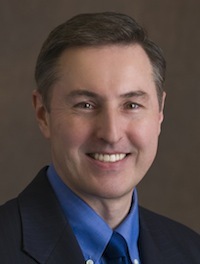Retired Dow exec joins UW, will focus on innovation
An industry executive who has spent his entire career translating inventions into products that are both profitable and beneficial to society has joined the University of Wisconsin–Madison.

Bill Banholzer
Bill Banholzer recently retired as an executive vice president and chief technology officer of the Dow Chemical Company. In September 2013, he joined the UW with appointments in the Department of Chemical and Biological Engineering and in the Wisconsin Energy Institute.
At Dow, Banholzer oversaw the activities of some 7,000 scientists and engineers around the world, and helped translate research and development efforts into new products and successful businesses ventures in photovoltaics, new composite materials, and energy storage.
And while he may have concluded his role as an executive and corporate R&D leader, Banholzer, 56, is simply taking the next step in his professional life.
Why the leap from business to academia? In part, the change is inspired by Banholzer’s desire to use his business sense to make a difference in research and education. “I think in universities there is a potential issue: People don’t always understand that great research doesn’t necessarily mean you have an impact on society,” he says.
A Milwaukee native, Banholzer will provide UW–Madison faculty, staff and students deep knowledge of and perspective on business and industry that can help broaden the university educational and research missions, says Provost Paul DeLuca. “Bill has unique leadership experience and accomplishments that will advance the missions of the UW Energy Institute, the College of Engineering and the Department of Chemical and Biological Engineering, build new partnerships with industry and government, and offer collaborative research and mentoring experiences for faculty and students,” he says.
“Invention is the start of everything. It’s critical. But innovation is when you use engineering fundamentals to down-select from a large number of options, to perfecting the one that cost-effectively addresses a specific problem. Only then do you impact society.”
Bill Banholzer
In particular, Banholzer brings to UW–Madison the kind of mindset needed to translate research into discoveries that are meaningful to society. “I have a unique ability to differentiate invention from innovation,” he says. “Invention is the start of everything. It’s critical. But innovation is when you use engineering fundamentals to down-select from a large number of options, to perfecting the one that cost-effectively addresses a specific problem. Only then do you impact society. Edison didn’t invent the light bulb, but he figured out how to make it work. Ford didn’t invent the automobile, but he figured out how to make it affordable.”
Banholzer himself has worked on everything from lighting and stealth materials for jet engines to the breadth of products Dow offers. Prior to his tenure at Dow, Banholzer spent 22 years with General Electric in positions that included vice president of global technology for GE Advanced Materials and vice president of engineering, quality and environmental health and safety for GE Lighting. His international reputation in the scientific community earned him election in 2002 to the National Academy of Engineering, and he serves on a variety of National Academy of Engineering, governmental and university committee and boards.
He also has lectured extensively to audiences ranging from investors to university students. “The university ones are always the most fun,” he says. “There’s just an energy on campus that’s unique. It’s always invigorating.”
That enthusiasm is among the aspects of university life Banholzer says he can’t wait to experience. He’s excited to contribute to the success of the Wisconsin Energy Institute, to share his practical business experience with students as a teacher and mentor, and to collaborate on research. “You have to know the difference between what’s possible and what’s practical, because practical is what makes society better,” he says.
Tags: chemistry, energy, engineering, faculty and staff, research




